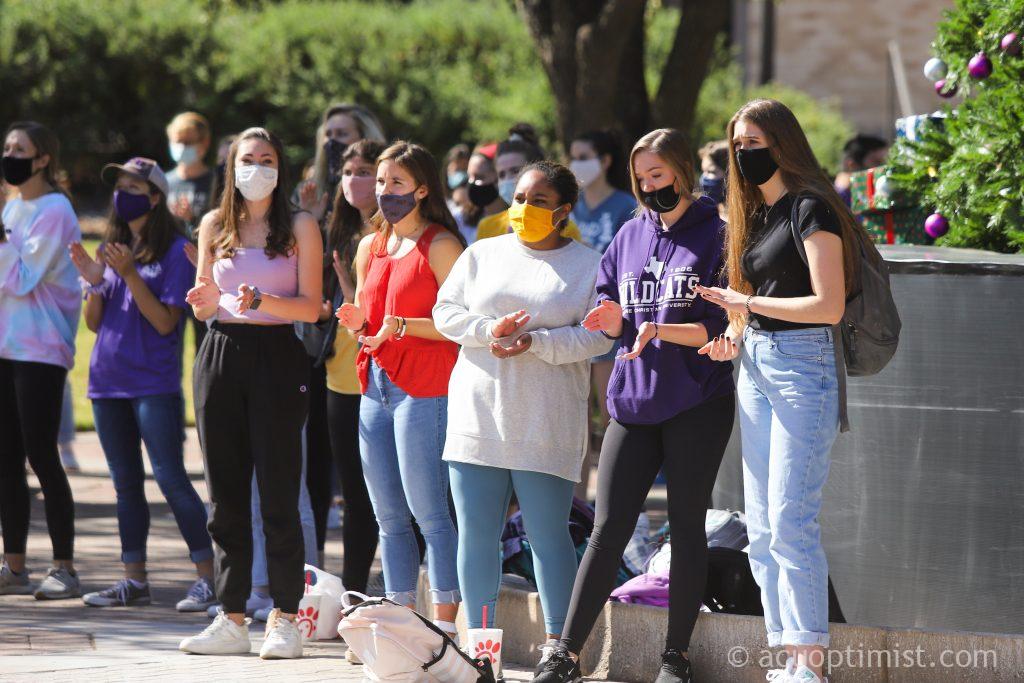This year has been anything but normal, filled with masks, cancelled events and desperate attempts at social distancing to try to keep the pandemic at bay.
Zoom calls and cancelled events seemed to be the theme of this school year but there’s hope that things may be returning to normal sooner rather than later.
COVID-19 is a phrase students across the country are tired of hearing and students on ACU’s campus are no exception to the multiple different impacts they’ve seen throughout their school year.
Online classes, masks and constantly changing plans mean students, faculty and staff have all started to feel the fatigue that came with this year.
Dr. Tamara Long, vice president for enrollment and student life, has been a key part in the university’s response to the coronavirus. A part of the COVID-19 emergency response team on campus, Long has been attending almost daily meetings with the goal of keeping students safe in mind. She, too, is feeling the fatigue that came with the school year.
“I’m the most exhausted I’ve ever felt at this point in my job in the year and the end of the year is always exhausting, but there’s a different kind of tired right now,” Long said. “We’ve given up a lot to provide the best possible experience for our students and we’re tired. Everyone’s tired, students are tired.”
As the year comes to end, there is some light at the end of the tunnel as many are hoping for things to return to normal as we move into next school year. Long is hopeful but says that normal for ACU is going to be different than normal used to be.
“I’m running as fast as I can into next year, I’m done with this year for sure and I think a lot of people feel that way,” Long said. “[It’s] not a return to normal, not that anything is normal. I think we don’t go backwards, we evolve and go forwards. I think everyone longs for a pace that is more sustainable and far less to constraints for doing our jobs.”
Departments across campus are feeling the impact of this year as well, with many of them having to change the way they educate their students to keep up with their normal criteria.
Departments of nursing, theater, biblical studies and so many more rely heavily on community and in person instruction to best teach their students, but have had to come up with different ways to make that happen.
Junior nursing major from Brownsville, Jamie Gonzalez, said that online classes were incredibly challenging and that she’s grateful to have been partly on campus and partly in-person during this school year.
“Having the professors here with me is great because if we were online I wouldn’t know what to do,” Gonzalez said. “It’s so overwhelming to be online and having professors accessible and able to interact with in person is very helpful.”
As a nursing student, Gonzalez has had to navigate through clinicals and labs in the time of COVID-19 and say’s they were able to continue their direct patient care with heavy restrictions.
“We still have to have masks and we have restrictions like we couldn’t go into COVID rooms,” Gonzalez said. “You have to have your guard up.”
Senior theater major from Abilene, Griffin Jones, is a well known face across campus, being a part of the theater department as well as being one of this year’s Sing Song hosts.
Both the theater department and Sing Song were hit hard by COVID-19 but Jones says he’s encouraged to see people still taking on opportunities they can.
“It’s also pretty encouraging to see people still taking these opportunities that they do get to have because so many opportunities were taken from us last year,” Jones said. “There were a lot of moments where it would be very easy to be like ‘It’s not what I wanted it to be, it’s not what I thought it would be’ but you just have to realize, that when the things we thought were sure and trustworthy aren’t, it makes you more aware and more grateful for any opportunity. Any chance I get to sing now I’m over the moon about it, it could be the smallest thing.”
For junior ministry and vocation major Jackson Eades, COVID-19 hit the hardest by taking away the close community that so many students on campus love.
“Just wearing a mask I think brought a lot of energy down,” Eades said. “None of my classmates met outside of class so it kind of led to a lack of community and a lack of fellowship that a lot of were really craving during this time so it was really tough and it left us feeling drained, overwhelmed and isolated.”
Moving forward into next year, students are hopeful. In early April the university announced that though vaccines are not going to be required, masks are not going to be required in fall.
Eades, like so many other students, is just excited to finally see other people’s faces again.
“I am cautiously optimistic,” Eades said. “I think if students this summer are adamant about getting vaccinated or staying safe and wearing masks, I would be absolutely stoked to see people’s face next semester, that’s something I really missed a whole whole lot. I think if everybody gets their act together that would be really great. I’d say mostly I’m just optimistic and hopeful.”

